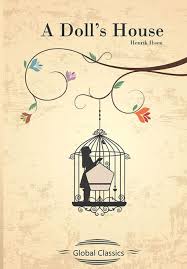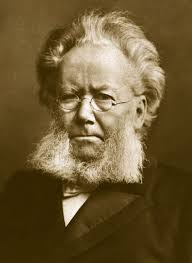A Doll's House Page #16
A Doll's House is a three-act play written by Henrik Ibsen. It premiered at the Royal Theatre in Copenhagen, Denmark, on 21 December 1879, having been published earlier that month. The play is set in the home of the Helmer family in an unspecified Norwegian town or city, circa 1879 and focuses on the awakening of a middle-class wife and mother.
Mrs. Linde. In my first moment of fright, it was. But twenty-four hours have elapsed since then, and in that time I have witnessed incredible things in this house. Helmer must know all about it. This unhappy secret must be disclosed; they must have a complete understanding between them, which is impossible with all this concealment and falsehood going on. Krogstad. Very well, if you will take the responsibility. But there is one thing I can do in any case, and I shall do it at once. Mrs. Linde (listening). You must be quick and go! The dance is over; we are not safe a moment longer. Krogstad. I will wait for you below. Mrs. Linde. Yes, do. You must see me back to my door... Krogstad. I have never had such an amazing piece of good fortune in my life! (Goes out through the outer door. The door between the room and the hall remains open.) Mrs. Linde (tidying up the room and laying her hat and cloak ready). What a difference! what a difference! Someone to work for and live for--a home to bring comfort into. That I will do, indeed. I wish they would be quick and come--(Listens.) Ah, there they are now. I must put on my things. (Takes up her hat and cloak. HELMER'S and NORA'S voices are heard outside; a key is turned, and HELMER brings NORA almost by force into the hall. She is in an Italian costume with a large black shawl around her; he is in evening dress, and a black domino which is flying open.) Nora (hanging back in the doorway, and struggling with him). No, no, no!--don't take me in. I want to go upstairs again; I don't want to leave so early. Helmer. But, my dearest Nora-- Nora. Please, Torvald dear--please, please--only an hour more. Helmer. Not a single minute, my sweet Nora. You know that was our agreement. Come along into the room; you are catching cold standing there. (He brings her gently into the room, in spite of her resistance.) Mrs. Linde. Good evening. Nora. Christine! Helmer. You here, so late, Mrs. Linde? Mrs. Linde. Yes, you must excuse me; I was so anxious to see Nora in her dress. Nora. Have you been sitting here waiting for me? Mrs. Linde. Yes, unfortunately I came too late, you had already gone upstairs; and I thought I couldn't go away again without having seen you. Helmer (taking off NORA'S shawl). Yes, take a good look at her. I think she is worth looking at. Isn't she charming, Mrs. Linde? Mrs. Linde. Yes, indeed she is. Helmer. Doesn't she look remarkably pretty? Everyone thought so at the dance. But she is terribly self-willed, this sweet little person. What are we to do with her? You will hardly believe that I had almost to bring her away by force. Nora. Torvald, you will repent not having let me stay, even if it were only for half an hour. Helmer. Listen to her, Mrs. Linde! She had danced her Tarantella, and it had been a tremendous success, as it deserved--although possibly the performance was a trifle too realistic--a little more so, I mean, than was strictly compatible with the limitations of art. But never mind about that! The chief thing is, she had made a success--she had made a tremendous success. Do you think I was going to let her remain there after that, and spoil the effect? No, indeed! I took my charming little Capri maiden--my capricious little Capri maiden, I should say--on my arm; took one quick turn round the room; a curtsey on either side, and, as they say in novels, the beautiful apparition disappeared. An exit ought always to be effective, Mrs. Linde; but that is what I cannot make Nora understand. Pooh! this room is hot. (Throws his domino on a chair, and opens the door of his room.) Hullo! it's all dark in here. Oh, of course--excuse me--. (He goes in, and lights some candles.) Nora (in a hurried and breathless whisper). Well? Mrs. Linde (in a low voice). I have had a talk with him. Nora. Yes, and-- Mrs. Linde. Nora, you must tell your husband all about it. Nora (in an expressionless voice). I knew it. Mrs. Linde. You have nothing to be afraid of as far as Krogstad is concerned; but you must tell him. Nora. I won't tell him. Mrs. Linde. Then the letter will. Nora. Thank you, Christine. Now I know what I must do. Hush--! Helmer (coming in again). Well, Mrs. Linde, have you admired her? Mrs. Linde. Yes, and now I will say goodnight. Helmer. What, already? Is this yours, this knitting? Mrs. Linde (taking it). Yes, thank you, I had very nearly forgotten it. Helmer. So you knit? Mrs. Linde. Of course. Helmer. Do you know, you ought to embroider. Mrs. Linde. Really? Why? Helmer. Yes, it's far more becoming. Let me show you. You hold the embroidery thus in your left hand, and use the needle with the right--like this--with a long, easy sweep. Do you see? Mrs. Linde. Yes, perhaps-- Helmer. But in the case of knitting--that can never be anything but ungraceful; look here--the arms close together, the knitting-needles going up and down--it has a sort of Chinese effect--. That was really excellent champagne they gave us. Mrs. Linde. Well,--goodnight, Nora, and don't be self-willed any more. Helmer. That's right, Mrs. Linde. Mrs. Linde. Goodnight, Mr. Helmer. Helmer (accompanying her to the door). Goodnight, goodnight. I hope you will get home all right. I should be very happy to--but you haven't any great distance to go. Goodnight, goodnight. (She goes out; he shuts the door after her, and comes in again.) Ah!--at last we have got rid of her. She is a frightful bore, that woman. Nora. Aren't you very tired, Torvald? Helmer. No, not in the least. Nora. Nor sleepy? Helmer. Not a bit. On the contrary, I feel extraordinarily lively. And you?--you really look both tired and sleepy. Nora. Yes, I am very tired. I want to go to sleep at once. Helmer. There, you see it was quite right of me not to let you stay there any longer. Nora. Everything you do is quite right, Torvald. Helmer (kissing her on the forehead). Now my little skylark is speaking reasonably. Did you notice what good spirits Rank was in this evening? Nora. Really? Was he? I didn't speak to him at all. Helmer. And I very little, but I have not for a long time seen him in such good form. (Looks for a while at her and then goes nearer to her.) It is delightful to be at home by ourselves again, to be all alone with you--you fascinating, charming little darling! Nora. Don't look at me like that, Torvald. Helmer. Why shouldn't I look at my dearest treasure?--at all the beauty that is mine, all my very own? Nora (going to the other side of the table). You mustn't say things like that to me tonight. Helmer (following her). You have still got the Tarantella in your blood, I see. And it makes you more captivating than ever. Listen--the guests are beginning to go now. (In a lower voice.) Nora--soon the whole house will be quiet. Nora. Yes, I hope so. Helmer. Yes, my own darling Nora. Do you know, when I am out at a party with you like this, why I speak so little to you, keep away from you, and only send a stolen glance in your direction now and then?--do you know why I do that? It is because I make believe to myself that we are secretly in love, and you are my secretly promised bride, and that no one suspects there is anything between us.
Translation
Translate and read this book in other languages:
Select another language:
- - Select -
- 简体中文 (Chinese - Simplified)
- 繁體中文 (Chinese - Traditional)
- Español (Spanish)
- Esperanto (Esperanto)
- 日本語 (Japanese)
- Português (Portuguese)
- Deutsch (German)
- العربية (Arabic)
- Français (French)
- Русский (Russian)
- ಕನ್ನಡ (Kannada)
- 한국어 (Korean)
- עברית (Hebrew)
- Gaeilge (Irish)
- Українська (Ukrainian)
- اردو (Urdu)
- Magyar (Hungarian)
- मानक हिन्दी (Hindi)
- Indonesia (Indonesian)
- Italiano (Italian)
- தமிழ் (Tamil)
- Türkçe (Turkish)
- తెలుగు (Telugu)
- ภาษาไทย (Thai)
- Tiếng Việt (Vietnamese)
- Čeština (Czech)
- Polski (Polish)
- Bahasa Indonesia (Indonesian)
- Românește (Romanian)
- Nederlands (Dutch)
- Ελληνικά (Greek)
- Latinum (Latin)
- Svenska (Swedish)
- Dansk (Danish)
- Suomi (Finnish)
- فارسی (Persian)
- ייִדיש (Yiddish)
- հայերեն (Armenian)
- Norsk (Norwegian)
- English (English)
Citation
Use the citation below to add this book to your bibliography:
Style:MLAChicagoAPA
"A Doll's House Books." Literature.com. STANDS4 LLC, 2024. Web. 25 Dec. 2024. <https://www.literature.com/book/a_doll%27s_house_400>.




Discuss this A Doll's House book with the community:
Report Comment
We're doing our best to make sure our content is useful, accurate and safe.
If by any chance you spot an inappropriate comment while navigating through our website please use this form to let us know, and we'll take care of it shortly.
Attachment
You need to be logged in to favorite.
Log In